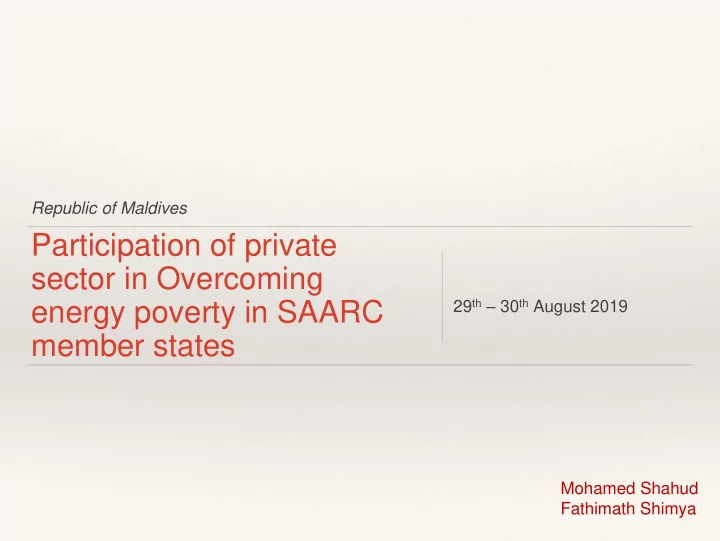

Republic of Maldives Participation of private sector in Overcoming 29 th – 30 th August 2019 energy poverty in SAARC member states Mohamed Shahud Fathimath Shimya
About Maldives Small country composed of 1190 tiny islands dotting the India Ocean. The islands are grouped in 26 natural atolls that together forming a chain of 820km in length and 130km in its widest point set in an area more than 90000km 2. Also Maldives is just 1.5m above sea level in average, making the country a danger for Sea level rise due to climate changes.
Energy Sector In order to meet the country’s energy demand, Maldives depends almost entirely on imported fossil fuels. As such, 10- 15% of our (GDP) is spent on fuel imports with the major portion being diesel, utilized for Electricity generation followed by the transport sector. As a result, this has adverse impacts on the development of the country. Therefore, it is with this justification that the Government has identified the development of affordable cleaner and renewable energy solutions as a strategic investment priority to improve the energy security of the country. As such, the Government of Maldives is en route to increase renewable energy share by installing Solar PV systems up to 70% of the peak load of electricity in all inhabited islands.
Energy Sector(part 2) ❖ In this regards, Maldives have installed 16MW of solar PV which only contributes to 6% of the total peak load. It is Maldives commitment to increasing this further, by installing solar PV up to at least 70% of the peak load of each inhabited island, by the end of the next 5 year and also through net metering involvements. ❖ We are also working on increase private investments on Renewable Energy through Power Purchasing Agreement and also a loan scheme through Bank of Maldives has been made available to the public and currently works are ongoing on reducing its interest rates through Green Fund.
The Current Energy-Related projects ❖ POISED(Preparing Outer Islands for Sustainable Energy Development) project by Government: funding and administration by Asian Development Bank ❖ Accelerating Private Investments in Renewable Energy (ASPIRE)( targeted to the private sector):-funding and administration by World Bank ❖ Strengthening Low-Carbon Energy Island Strategies (LCEI) - funding and administration Global Environment Facility
Project Details (ASPIRE): Build-up a structure to facilitate private investment in RE, including ❖ solar photovoltaics (PV), wind, waste, and other RE technologies; formulation of an energy integration plan for greater Male’ region maximizing the use of RE, and capacity building in PV technology. (LCEI): Mainstream energy efficiency measures into policies, guidelines, ❖ standards and building practices in the Maldives and to achieve a substantial reduction of GHG emissions as a result of improved buildings and building management practices and to influence substantial investment in activities leading to increased energy efficiency. (POISED): Transforming the existing energy grids onto a hybrid renewable ❖ energy system. Installing energy management and control systems; energy storage; and improvements in distribution networks, in order to significantly reduce the need for diesel to generate electricity.. The project will replace inefficient diesel-based power generation grids on the islands with hybrid systems of both renewable energy and diesel in order to reduce the cost of electricity and the emissions created, as well as lower the subsidy burden on the government budget.
Challenges faced ❖ Long term strategic direction and focused policies will be fundamental to eliminate the duplication of works. ❖ Determining the success of budgeting and execution of sectoral programs towards implementation of SDGs ❖ Lack of technical expertise, in terms of data collection and management ❖ Enhanced collaboration across Government agencies is required to monitor and track progress ❖ Strength administrative data available at all sectors ❖ Limited institutional capacity ❖ Limited energy entrepreneurship
Overcoming challenges ❖ Government should review the policy, regulatory and technical issues that would need to be resolved to support large scale private investments in RE, particularly PV ❖ Also should examine the support schemes and market mechanisms which have developed ensuring to achieve a reasonable return while reducing electricity cost for consumers by establishing net metering mechanism or ensuring regulations allow third party ownership or renewable energy system leasing
Strategies proposed ❖ Train Technical personnel at all levels of the energy sector ❖ Strengthen the policy making and regulatory bodies in the energy sector and maintain the energy policy. ❖ Initiation of Companies to start renewable energy projects
Other programs to increase private sector involvement in clean energy : Promoting solar energy through Net ❖ metering regulation. Conducting Awareness throughout ❖ the country Installation of PV on public roof space ❖ and wind farms on public land LUX South Ari Atoll Resort Installs ❖ worlds Largest system of Solar power system named as Solar Sea 50 Megawatt to power up Maldives ❖ capital concepts by STELCO President Mohamed Nasheed has ❖ informed the country would go carbon neutral by 2020.
Conclusion and summary ❖ More researches needs to be carried out to increase the pace of renewable energy adoption, devise strategies to increase the share of renewables in the total energy generation. ❖ Address the issues and challenges related to deliver energy services ❖ Strengthening the capacity of energy institutions at the national and local levels ad their delivery mechanisms ❖ Enhance energy access to the poor necessitates the development of partnerships between public and private entrepreneurship, including removing barriers to private sector participation ❖ Public private partnerships need to be encouraged in developing cost effective decentralized and gender sensitive renewable energy programmes.
THANK YOU
Recommend
More recommend